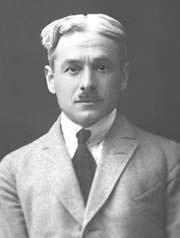Hamdullah Suphi Tanrıöver
Hamdullah Suphi Tanrıöver (* 1885 in Istanbul ; † June 10, 1966 there ) was a Turkish poet and politician.
Life
Hamdullah Suphi Tanrıöver was born in Istanbul in 1885 as the son of the Ottoman politician and education minister Abdüllatif Suphi Pascha. He attended the Galatasaray High School until 1904 and then worked as a translator and from 1908 to 1913 as a teacher of Turkish at the Ayasofya Military School and the School for Teacher Training. At the Ottoman University of Darülfünun , which later became the University of Istanbul , he was professor of Islamic art from 1913 to 1920.
During his childhood, the family home was the meeting place for well-known Ottoman poets who influenced Tanrıöver. He published his first poems in the literary newspaper Şurâ-yı Ümmet , which his uncle published in Paris . Soon he was writing for the literary magazines Genç Kalemler and Davul .
In 1913 he became chairman of the Türk Ocağı , an association that promoted Turkish nationalism. Tanrıöver became one of the most influential thinkers of the Turkic-Nazi and panturanischen movement. In 1913 he took part in the Turkist Congress in Geneva, which for the first time determined who was a Turk. Tanrıöver spoke out against too narrow an ethnic definition. He shaped the image of the Turkish house . He led the association until it was banned in 1931. He was also a member of a committee that was supposed to investigate the situation of the Turks in the Balkans after the Balkan War (1912/13).
During the Turkish War of Liberation (1919-1923) Tanrıöver joined the national resistance of Mustafa Kemal Pascha (Ataturk) and became a member of the last Ottoman parliament; In the first Turkish parliament he was a member of the Saruhan (today Manisa Province ). From December 13, 1920 to November 20, 1921, he was the state's education minister in the 1st, 2nd and 3rd councils of enforcement officers.
After the founding of the republic, he was again Minister of Education between March 3 and December 21, 1925. In 1931 he was appointed Ambassador of Turkey to Romania and remained in office until 1944. He was particularly committed to helping the country's citizens of Turkish origin. In 1943 he was elected to the Turkish National Assembly for Cumhuriyet Halk Partisi (CHP) and the Istanbul constituency. In 1950 he became a member of the newly founded Democrat Parti due to the dispute to improve freedom of the press, and in 1954 he entered the National Assembly for the party. A few years later he and others founded the Hürriyet Partisi . He lost his mandate in the parliamentary elections in Turkey in 1957 , in which the HP could only win four seats.
Tanrıöver was married to Ayşe Saide, who is said to have been the descendant of the Anatolian Beylik rulers Isfendiyariden and Ramazaniden . He died on June 10, 1966 and was buried in the Merkezefendi cemetery in Istanbul.
Works
- Namık Kemal Bey Magosa'da . 1909 (documentation on " Namık Kemal in Famagusta)
- Günebakan . 1928 (essays)
- Dağyolu . 1931 (speeches)
- Anadolu Milli Mücadelesi . 1946
literature
- Mustafa Baydar: Hamdullah Suphi tanriöver ve anıları . Menteş Kitabevi, 1968
Web links
Individual evidence
- ↑ a b Hamdullah Suphi Tanrıöver , Kim Kimdir ?, accessed April 23, 2018
- ↑ a b c d e Hamdullah Suphi Tanrıöver , Biyografya, accessed on April 23, 2018 (Turkish / English)
- ↑ a b Sabine Mangold-Will: Limited Friendship: Germany and Turkey 1918–1933 . Wallstein Verlag, Göttingen 2013, pp. 50–52
- ↑ Doğan Dürpınar: Ottoman / Turkish Visions of the Nation, 1860-1950 . Palgrave Macmillan, London 2003, p. 65
- ^ Günaydın , Takvim, October 18, 2012
- ↑ Biography , biyografi.info (Turkish)
- ↑ Hamdullah Suphi Tanrıöver Anıldı , Istanbul Times, June 11, 2016 (Turkish)
| personal data | |
|---|---|
| SURNAME | Tanrıöver, Hamdullah Suphi |
| BRIEF DESCRIPTION | Turkish politician and author |
| DATE OF BIRTH | 1885 |
| PLACE OF BIRTH | Istanbul |
| DATE OF DEATH | June 10, 1966 |
| Place of death | Istanbul |
